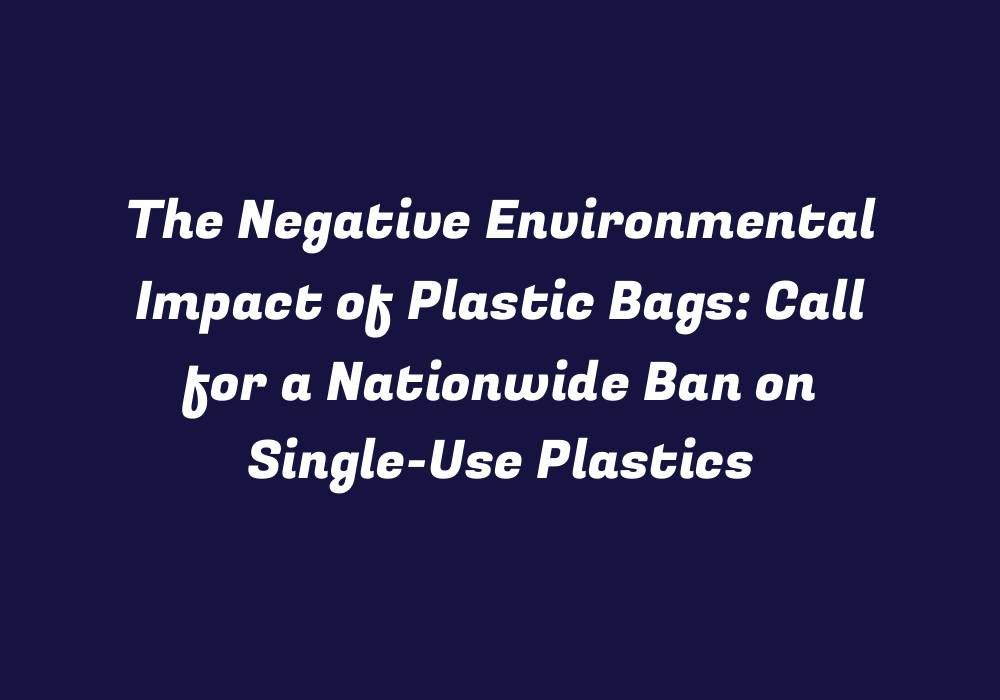Introduction
Plastics have become a part of our daily lives, with their widespread usage contributing to the convenience and efficiency of various industries. However, their negative impact on the environment cannot be overlooked anymore. Single-use plastics are one of the primary sources of pollution, affecting ecosystems, wildlife, and human health. In light of this situation, it’s crucial for nations across the globe to consider implementing a nationwide ban on single-use plastics, particularly focusing on plastic bags.
Negative Environmental Impacts
Plastic pollution has become a pressing concern in recent times as a result of its harmful impacts on various aspects of our environment. Among these detrimental effects is the creation of microplastics that make their way into water bodies, harming aquatic life and ultimately entering the human food chain through consumption. Plastic bags are responsible for significant pollution too due to their disposability. These lightweight bags easily float in air currents or water streams, traveling long distances before eventually reaching landfills or other environments such as oceans and rivers.
Degradation of Habitats
Plastic bag pollution directly impacts ecosystems by degrading habitats for various plant and animal species. The plastic particles act as a physical barrier, hindering the growth and development of organisms. Moreover, they can serve as food sources for wildlife that accidentally consume them, leading to harmful consequences for their health. This issue is not limited to land-based ecosystems but also extends to marine environments. Plastic bags are ingested by marine life, with devastating impacts on their population and biodiversity.
Contribution to Climate Change
Plastic bags contribute to climate change through their entire life cycle. From extraction of raw materials such as fossil fuels during production to energy consumption in the manufacturing process, they emit significant amounts of greenhouse gases like carbon dioxide and methane. Moreover, when plastic bags end up in landfills or oceans, they take hundreds of years to decompose. The slow decomposition process further leads to the release of harmful toxins such as phthalates into the environment, exacerbating the already adverse effects of climate change.
Human Health Risks
The use of plastic bags also presents risks for human health. Plastic particles can be inhaled or ingested through contaminated food and water sources. Nanoparticles from microplastics have been shown to cause inflammation, cell damage, and even cancer in human cells when ingested. Furthermore, exposure to chemicals found in plastic bags such as bisphenol A (BPA) has been linked to endocrine disruption and reproductive issues.
Moving Towards a Nationwide Ban on Single-Use Plastics
In response to the numerous negative impacts of plastic pollution, nations across the globe have begun to consider implementing bans on single-use plastics. The European Union recently proposed a ban on single-use plastics by 2030, including items such as straws, cutlery, and stirrers. Similarly, countries like China have already implemented a nationwide ban on plastic bags in some regions, with plans to extend the ban to other parts of the country.
Alternatives to Plastic Bags
As nations shift towards reducing plastic bag usage, it’s essential to explore alternatives that can address the need for convenience and efficiency without compromising environmental sustainability. Some potential alternatives include:
1. Reusable cloth bags: Made of eco-friendly materials like cotton or jute, these bags can be used multiple times before being disposed of, making them a more environmentally friendly option.
2. Paper bags: While they may not be as durable as plastic bags, paper bags are biodegradable and more sustainable. However, it is essential to consider their production process, as paper production can be energy-intensive and contribute to deforestation if not sustainably managed.
3. Cardboard boxes or packaging: These options are recyclable and often made from renewable materials. They offer a more durable alternative for transporting items such as groceries while keeping the focus on environmental responsibility.
Conclusion
The negative impacts of plastic bags on our environment, ecosystems, wildlife, and human health are undeniable. As nations grapple with finding sustainable alternatives to single-use plastics, it is crucial to consider implementing nationwide bans on these harmful materials. By investing in research and development for eco-friendly alternatives like reusable cloth bags and exploring more environmentally friendly packaging options, we can collectively work towards a healthier future for our planet and its inhabitants.
